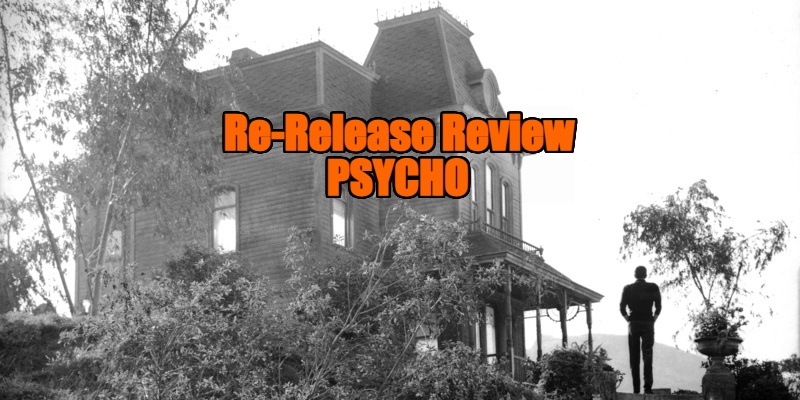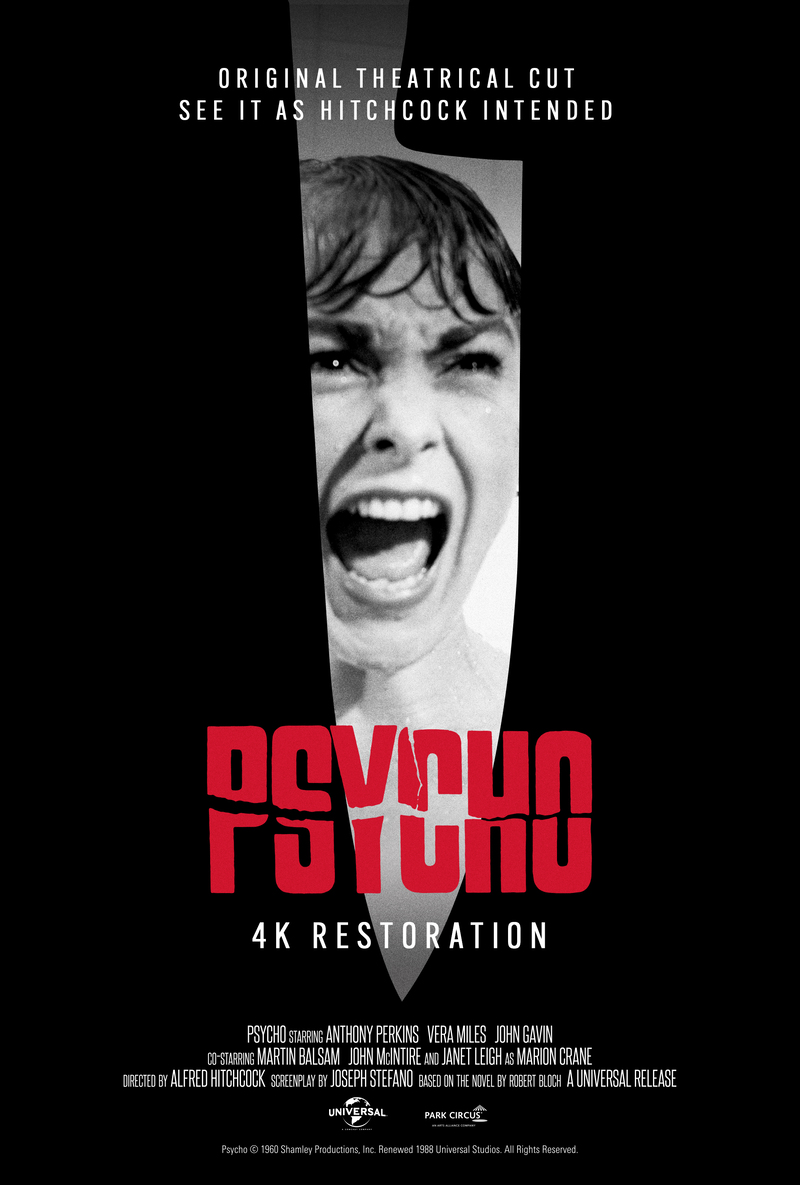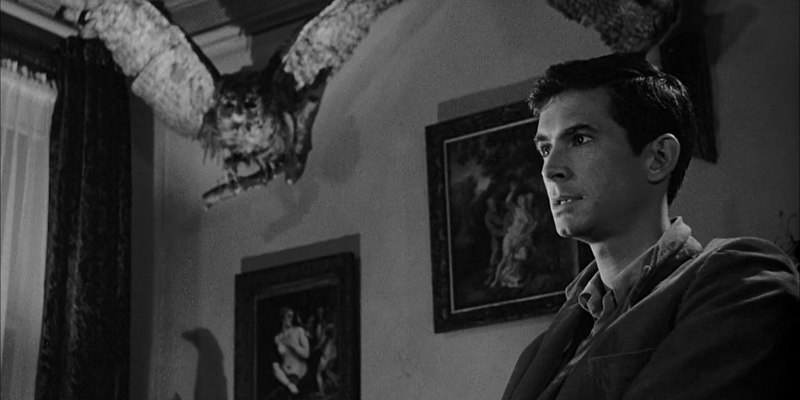
Review by
Eric Hillis
Directed by: Alfred Hitchcock
Starring: Janet Leigh, Anthony Perkins, Vera Miles, John Gavin, Martin Balsam, John McIntire, Vaughn Taylor
Directed by: Alfred Hitchcock
Starring: Janet Leigh, Anthony Perkins, Vera Miles, John Gavin, Martin Balsam, John McIntire, Vaughn Taylor

Arizona secretary Marion Crane (Janet Leigh) wants nothing more than
to wed her lover, Sam Loomis (John Gavin), but the pair are dead
broke. When Marion's real estate boss (Vaughn Taylor) entrusts her
with a client's $40,000, the young woman seizes the opportunity and leaves
Phoenix, headed for California and the prospect of a new, financially secure
life with her lover. That night she pulls into a motel run by a charming
young man, Norman Bates (Anthony Perkins), and following an
insightful conversation with him, Marion decides she will return the money
to Phoenix first thing in the morning. Before retiring to bed, however, she
decides to take a shower...
In 1960, Hollywood was in trouble. Television sets had finally penetrated
the American home to an almost comprehensive degree. To combat the threat of
small screen entertainment, Hollywood had gone big, using gimmicks like 3D
and
various widescreen formats
to entice audiences away from the goggle box and back into theatres. Many of
these mega-budget movies had been massive flops, placing studios in serious
financial trouble. This meant filmmakers, even those as respected as
Alfred Hitchcock, were forced to reign in their creative ideas.
Studios wanted safe bets, not experimentation. Hitchcock, however, had spent
his entire career experimenting with cinema, and wasn't about to stop
now.

The movie moguls of Tinseltown were focussed on giving audiences something they couldn't get on TV - spectacle. But there were two other things you couldn't see on TV in 1960 - sex and violence! Using these two elements, a new wave of low budget filmmakers like Roger Corman and William Castle were raking it in, enticing viewers back into theatres, or at least drive-ins, with the dual promise of titillation and terror. It was a promise largely unfulfilled, despite the lavish claims of the films' extravagantly lurid posters, as this was, after all, still the era of the Hays Code. But the sight of bikini babes ravished by crab monsters wasn't something you were going to see on Father Knows Best and audiences flocked in their droves to exploitation movies, at the expense of many a lavish, star-studded spectacle.
Hitchcock was fascinated by these low-budget movies and wondered, rather
egotistically, what it would be like if a great filmmaker like himself were
to venture into the world of exploitation films. When Robert Bloch's
novel Psycho landed on his desk, Hitchcock immediately decided this was to be his
next movie. Loosely inspired by the exploits of Wisconsin murderer Ed Gein
(later to inspire '70s grindhouse favorites The Texas Chain Saw Massacre and Deranged), Bloch's novel contained all the sleazy elements Hitchcock was after. The
execs at Paramount, where Hitchcock was currently under contract, were
repulsed by the idea and refused to fund it, leading the director to take
the gamble of self-financing the film, shooting on Universal's stages with
his Alfred Hitchcock Presents TV crew. It's a gamble that paid
off massively when the film earned $60 million at the box office from a
budget of $800,000, leaving those Paramount suits looking decidedly
foolish.


If Vertigo is the critical darling of Hitchcock's oeuvre, Psycho is certainly the people's favourite. Ask any casual film-goer to name a Hitchcock film and this is the reply you'll most likely receive. Like many Hitchcock fans, I find its status somewhat irksome, as its popularity overshadows at least a dozen less acknowledged yet superior movies from the director's catalog. While time has been kind to Psycho and modern critics now appreciate it for the great thriller it is, the reaction on its original release was vehement, with many critics confessing to walking out before the film's climax. "It is incumbent on us to inspect the real horrors of our time, but we don't have to traffic with Hitchcock's giggling obscenities," Robert Hatch wrote in his review for The Nation, while back in Hitchcock's homeland, Observer critic CA Lejeune wrote "I couldn't give away the ending if I wanted to, for the simple reason that I grew so sick and tired of the whole beastly business that I didn't stop to see it." Lejeune, who had been similarly repelled by Michael Powell's Peeping Tom, was so adversely affected by Psycho that she quit her job after writing her review.
It would seem the atrocities critics believed they graphically witnessed on
screen had been enough to turn them off Hitchcock's thriller. But this, of
course, was the director's great trick. Though the film contains some brutal
knife murders, we never actually see anyone physically stabbed. The famous
shower scene uses editing in such a rapid manner that we feel the violence
without actually seeing it. We're never explicitly shown a knife cutting
flesh but the physical cutting of the small strips of film, some as short as
three frames, has an incredible psychological effect on us. Those of us too
young to have experienced the film on its 1960 release can only wonder how
audiences must have reacted to this scene. Previously, murders generally
occurred off screen, so to witness a scene of violence handled with the same
level of craftsmanship (the scene took a week to shoot) as a lavish MGM
dance number must have been quite something. While audiences never actually
witnessed any explicit violence, had they looked carefully they would have
seen the exposed nipple of Leigh's body double, Playboy cover girl
Marli Renfro, a cheeky middle finger to the unobservant censors from
Hitchcock.
It's rare for Hitchcock to be outshone, or even equalled, by the work of
his collaborators, but the contributions of Perkins and composer Bernard Herrmann
are just as much a part of Psycho's success as his direction. Perkins' turn as Norman Bates is arguably
the best performance by any male actor in a Hitchcock movie, rivalled only
by Jimmy Stewart's Scottie Ferguson in Vertigo or Joseph Cotten's Uncle Charlie in Shadow of a Doubt. As a modern audience, the film's twist is ingrained in our cultural
awareness alongside those of Planet of the Apes and The Crying Game (though the latter's revelation had previously been pulled off in
the low budget slasher Sleepaway Camp). This allows us to appreciate Perkins' performance all the more as even
though we know what he's responsible for, we can't help but empathise with
him. Who among us doesn't will Marion's incriminating car into the swamp
when it becomes momentarily stuck in the mud on Norman's attempt to
dispose of the evidence of "Mother's" crime?

Along with Hitchcock and Perkins, Herrmann's work on Psycho is responsible for elevating its status but it could have been very different had the composer obeyed his director's initial request for a jazz-influenced score. The reduced budget meant Herrmann couldn't afford the full symphonic orchestra he was used to working with and instead solely employed a string section. The result is arguably the most identifiable score in cinema history, and certainly the most imitated. For decades, until the emergence of the synthesizer, composers ripped off Herrmann's score when working on horror movies. Listen to Pino Donaggio's score for Brian De Palma's Carrie or Harry Robertson's work on Hammer's The Vampire Lovers and it's easy to hear where they took their cues from. For the 1985 horror comedy, Re-Animator, composer Richard Band took Herrmann's score and altered it in minuscule detail, turning it into a more comedic sounding score, a technique made popular by the many musical homages of the animated TV hit The Simpsons. Of course, it's Herrmann's accompanying staccato string 'stabs' for the shower scene that are most well known, but the more low key incidental themes are equally chilling, making effective use of low end bass to create a disturbing ambience.
Credit for Psycho's iconic status must also go to production designer
Robert Clatworthy and art director Joseph Hurley, the men
responsible for designing the Bates' house. The pair took Edward Hopper's
1925 painting, 'House by the Railroad', as inspiration and created the
creepiest building ever seen on screen. To this day it's a highlight of the
Universal Studios tour.
The shower scene. The haunting score. Perkins' unforgettable performance.
Psycho may not be Hitchcock's greatest achievement, but it's arguably his
most iconic and certainly his most influential work.


Psycho is in UK/ROI cinemas from
May 27th.
